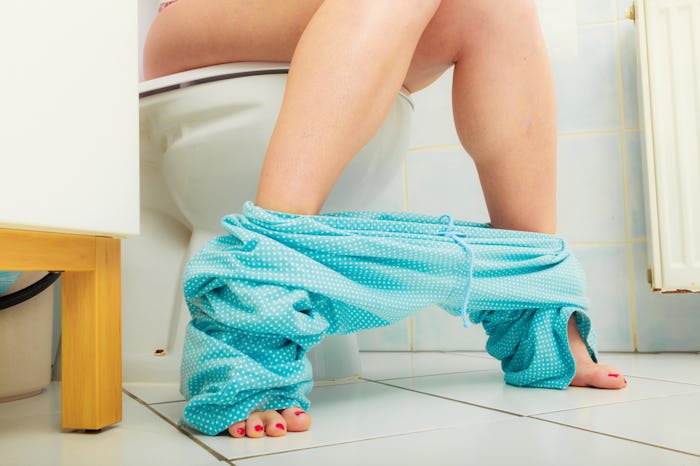Every woman’s experience when her water breaks is different. In some circumstances, she may even need her water broken manually in a hospital. If it comes unexpectedly, sometimes there’s a pop and a waterfall of gushing water, and sometimes, there’s just a trickle. You may even confuse your water breaking for peeing and can only tell it's amniotic fluid, and not urine, when it continues to flow or turns into a gush. Though your water breaking and peeing may feel like similar sensations, they're two very different things. With that said, can you still pee after your water breaks? You've gone through a long pregnancy with a small bladder — how does your water breaking affect that?
According to OB-GYN Kameelah Phillips, "You can absolutely urinate after your water breaks. The amniotic fluid will leak out of your vagina, while urine leaves your body through the urethra. These are two entirely separate systems, and the ability to urinate is not affected," she tells Romper.
Since they are two entirely different things, some women experience their water breaking at the same time they are peeing. Not only is that great multitasking, but that certainly saves you and your partner from the clean-up later. Kudos to you, great thinking. (I know you can’t really plan or time these things, but I won’t tell anyone if you don’t.)
The "water" everyone refers to is amniotic fluid, which is a combination of baby urine, proteins, hormones, and antibodies that prevent infection, Phillips adds.
Most women know that when their water breaks, it means there is a tear in the amniotic sac, which is what protects the baby while they are in utero and where they live for nine months. So what exactly causes the sac to spring a leak? Phillips says it’s not entirely clear what causes the amniotic sac, or water, to break. "Assuming you are full term (at least 37 weeks), it may be due to complex signaling from the fetal brain saying it is time to be born, an underlying infection, or thinning of the membranes associated with labor," she says.
Once your water breaks, how much time do you have to get to the hospital, birthing center, or home birth position before things start to progress quickly? Phillips says it depends on how many prior pregnancies you’ve had, the baby’s position, and the GBS status.
According to the American Pregnancy Association, GBS is Group B Streptococcus, which is a "type of bacterial infection that can be found in a pregnant woman’s vagina or rectum, and it can be passed to the baby during delivery."
One of the symptoms of GBS is if you go into labor before 37 weeks, so if your water breaks early, you may want to get to the hospital as soon as possible to ensure your baby doesn’t become ill from GBS.
If you’re planning on having your baby in a hospital, and you want an epidural, Phillips says the time between when your water breaks and when it’s too late for an epidural depends on how quickly your labor progresses, your preference, and different hospital practices. "For most hospitals, there is not a set time frame — a patient may arrive fully dilated and receive an epidural if she is not ready to push, and can remain still for the procedure," she says.
Once your water breaks, your nerves will more than likely begin to kick in since you’re so close to having a new baby in your arms and your life changing forever. It’s understandable if you have to pee after your water breaks — nerves will do that to you. So feel free to go after (or during) your water breaking.
